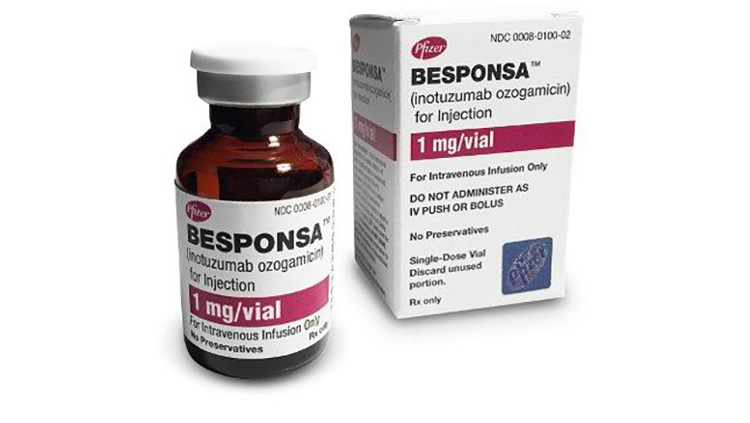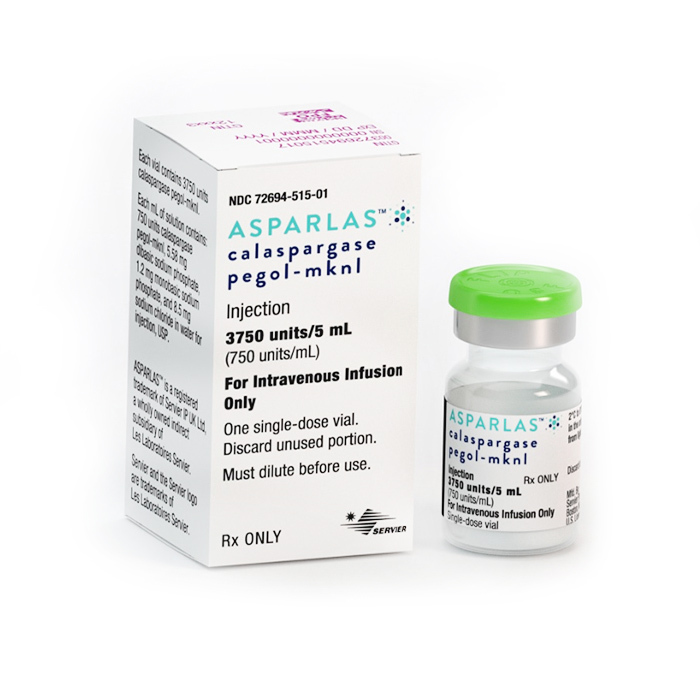Besponsa (inotuzumab ozogamicin) vs Asparlas (calaspargase pegol-mknl)
Besponsa (inotuzumab ozogamicin) vs Asparlas (calaspargase pegol-mknl)
Besponsa (inotuzumab ozogamicin) is an antibody-drug conjugate specifically targeting CD22, a protein commonly found on the surface of cancer cells in B-cell precursor acute lymphoblastic leukemia (ALL), leading to the delivery of a cytotoxic agent directly to the cancer cells. Asparlas (calaspargase pegol-mknl) is a modified enzyme used as a part of chemotherapy to deplete the amino acid asparagine, which certain leukemia cells require to survive, and is indicated for the treatment of ALL in pediatric and young adult patients. The choice between Besponsa and Asparlas would depend on the specific characteristics of the leukemia, the patient's age, the presence of CD22 on the leukemia cells, and the patient's overall treatment plan as determined by their healthcare provider.
Difference between Besponsa and Asparlas
| Metric | Besponsa (inotuzumab ozogamicin) | Asparlas (calaspargase pegol-mknl) |
|---|---|---|
| Generic name | Inotuzumab ozogamicin | Calaspargase pegol-mknl |
| Indications | Acute lymphoblastic leukemia (ALL) | Acute lymphoblastic leukemia (ALL) |
| Mechanism of action | Antibody-drug conjugate targeting CD22 | Modified enzyme that breaks down asparagine |
| Brand names | Besponsa | Asparlas |
| Administrative route | Intravenous | Intravenous |
| Side effects | Fever, nausea, liver toxicity, etc. | Allergic reactions, liver toxicity, pancreatitis, etc. |
| Contraindications | Hypersensitivity to inotuzumab ozogamicin or its components | Hypersensitivity to calaspargase pegol-mknl or any excipients |
| Drug class | Antineoplastic agent | Asparagine specific enzyme |
| Manufacturer | Pfizer | Servier Pharmaceuticals |
Efficacy
Besponsa (Inotuzumab Ozogamicin) for Leukemia
Besponsa (inotuzumab ozogamicin) is a targeted therapy approved for the treatment of adults with relapsed or refractory B-cell precursor acute lymphoblastic leukemia (ALL). This monoclonal antibody drug conjugate targets the CD22 antigen on B cells and is linked to a cytotoxic agent. Clinical trials have demonstrated the efficacy of Besponsa in inducing complete remission in a significant percentage of patients with relapsed or refractory ALL. In a pivotal phase 3 trial, patients treated with Besponsa showed a higher complete remission rate and longer progression-free survival compared to those treated with standard chemotherapy.
The efficacy of Besponsa is particularly notable in the context of relapsed or refractory ALL, a setting where treatment options are limited and the prognosis is poor. The ability of Besponsa to target specific cells while sparing others reduces some of the side effects associated with traditional chemotherapy, although it can still have serious adverse effects. The drug's approval provided an important new option for patients with this aggressive form of leukemia.
Asparlas (Calaspargase Pegol-mknl) for Leukemia
Asparlas (calaspargase pegol-mknl) is a pegylated form of the enzyme asparaginase, which is used as part of a multi-agent chemotherapeutic regimen for the treatment of acute lymphoblastic leukemia (ALL). Asparlas has been specifically designed to have an extended circulating half-life, allowing for less frequent dosing compared to other forms of asparaginase. This can be beneficial in terms of patient compliance and quality of life. The enzyme works by depleting the amino acid asparagine, which leukemic cells are unable to synthesize and are thus reliant upon from external sources. By depleting asparagine, Asparlas starves the leukemic cells, inhibiting their growth and survival.
In clinical studies, Asparlas has been shown to maintain asparagine depletion with a dosing schedule of once every three weeks, which is less frequent than the schedules required for other asparaginase products. This extended activity aligns with the standard treatment intervals for ALL chemotherapy regimens, potentially allowing for better integration into treatment protocols. While Asparlas does not represent a standalone treatment for ALL, its efficacy as part of a combination regimen is an important component in the overall management of the disease.
Regulatory Agency Approvals
Besponsa
-
European Medical Agency (EMA), European Union

-
Food and Drug Administration (FDA), USA

Asparlas
-
Food and Drug Administration (FDA), USA

Access Besponsa or Asparlas today
If Besponsa or Asparlas are not approved or available in your country (e.g. due to supply issues), you can access them via Everyone.org.
How it works

Make an enquiry
Choose the medicine you want to buy, answer a couple of questions, and upload your prescription to speed things up. We’ll get back to you within 24 hours.


Make an enquiry
Choose the medicine you want to buy, answer a couple of questions, and upload your prescription to speed things up. We’ll get back to you within 24 hours.


Breeze through the paperwork
We'll guide you through the required documents for importing unapproved medicine, ensuring you have all the necessary information.


Get a personalized quote
We’ll prepare a quote for you, including medicine costs and any shipping, administrative, or import fees that may apply.


Receive your medicine
Accept the quote and we’ll handle the rest - sourcing and safely delivering your medicine.

Some text on this page has been automatically generated. Speak to your physician before you start a new treatment or medication.
Let's talk
If you have any questions, call us or send us a message through WhatsApp or email:
Contact us




